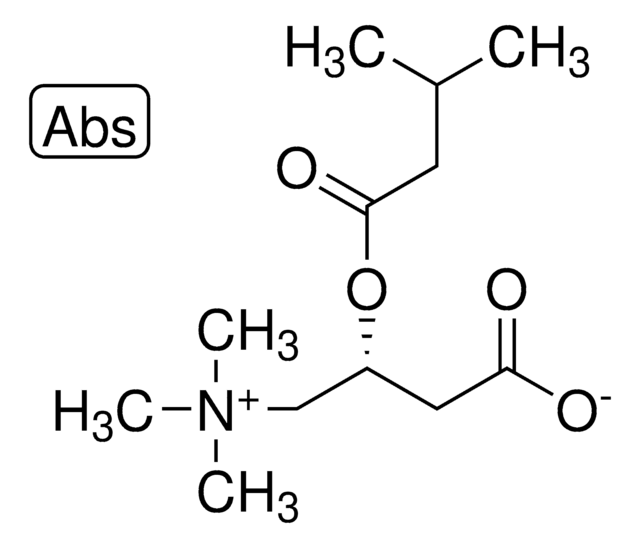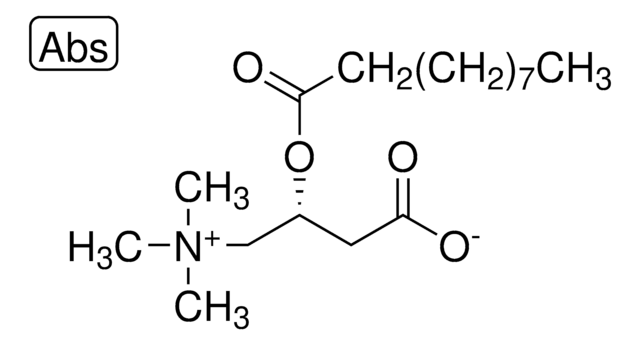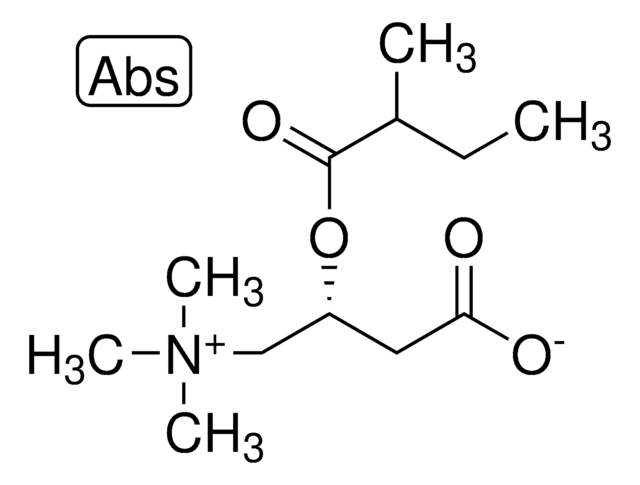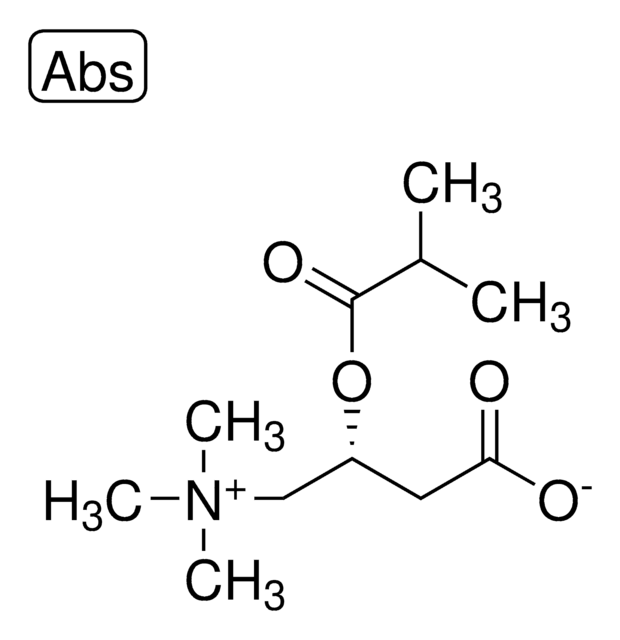42602
Propionyl-L-carnitine
≥94.0% (HPLC), suitable for LC/MS
동의어(들):
(2R)-3-Carboxy-N,N,N-trimethyl-2-(1-oxopropoxy)-1-propanaminium inner salt, L-Carnitine propionyl ester, C3-Carnitine, Propanoyl-L-carnitine
로그인조직 및 계약 가격 보기
모든 사진(1)
About This Item
실험식(Hill 표기법):
C10H19NO4
CAS Number:
Molecular Weight:
217.26
MDL number:
UNSPSC 코드:
12352209
PubChem Substance ID:
NACRES:
NA.26
추천 제품
제품명
Propionyl-L-carnitine, ≥94.0% (HPLC)
Quality Level
분석
≥94.0% (HPLC)
양식
powder or crystals
광학 활성
[α]/D -23±3°, c = 1 in H2O
기술
LC/MS: suitable
불순물
≤10% water (calcd. from elemental analysis)
색상
white to off-white
저장 온도
2-8°C
SMILES string
[O-]C(C[C@@H](OC(CC)=O)C[N+](C)(C)C)=O
InChI
1S/C10H19NO4/c1-5-10(14)15-8(6-9(12)13)7-11(2,3)4/h8H,5-7H2,1-4H3/t8-/m1/s1
InChI key
UFAHZIUFPNSHSL-MRVPVSSYSA-N
유사한 제품을 찾으십니까? 방문 제품 비교 안내
일반 설명
Propionyl-L-carnitine (PLC) is a short-chain fatty acid ester derivative of carnitine.
애플리케이션
Propionyl-L-carnitine has been used as a standard in liquid chromatography-tandem mass spectrometry (LC-MS/MS).
생화학적/생리학적 작용
Propionyl-L-carnitine (PLC) plays a key role in lipid and carbohydrate metabolism. It provides substrates to the ischemic muscle for energy production and ATP generation. PLC has the potential to treat severe peripheral arterial disease and chronic heart failure. It is present in high abundance in the urine of patients with methylmalonyl-CoA mutase (MUT) deficiency, together with methylmalonic acid. MUT is a mitochondrial enzyme that catalyzes the isomerization of methylmalonyl-CoA to succinyl-CoA.
Storage Class Code
11 - Combustible Solids
WGK
WGK 3
Flash Point (°F)
Not applicable
Flash Point (°C)
Not applicable
이미 열람한 고객
Santica M Marcovina et al.
Translational research : the journal of laboratory and clinical medicine, 161(2), 73-84 (2012-11-10)
Mitochondria play important roles in human physiological processes, and therefore, their dysfunction can lead to a constellation of metabolic and nonmetabolic abnormalities such as a defect in mitochondrial gene expression, imbalance in fuel and energy homeostasis, impairment in oxidative phosphorylation
Carmen Mingorance et al.
Nutrition reviews, 69(5), 279-290 (2011-04-28)
Propionyl-L-carnitine (PLC) is a naturally occurring derivative of carnitine that plays an important role in the metabolism of both carbohydrates and lipids, leading to an increase of ATP generation. PLC, however, is not only a metabolic drug; it is also
M J Cipolla et al.
Journal of vascular surgery, 29(6), 1097-1103 (1999-06-09)
The vasoactive effects of propionyl-L-carnitine (PLC) on human arteries, including endothelial and smooth muscle cell influences, were studied. Small (less than 200 microm) subcutaneous fat arteries (n = 19), obtained from human patients undergoing vascular surgery, were dissected and mounted
William R Hiatt et al.
Journal of cardiopulmonary rehabilitation and prevention, 31(2), 125-132 (2010-09-24)
Exercise training is established for the treatment of peripheral artery disease; however the additional benefit of pharmacologic therapy with exercise has not been studied. This trial tested the hypothesis that propionyl-L-carnitine (PLC), in combination with monitored home-based exercise training, would
Qixiao Jiang et al.
Environmental toxicology and pharmacology, 48, 116-124 (2016-10-25)
Perfluorooctanoic acid (PFOA), a persistent organic pollutant, is associated with developmental toxicity. This study investigated the mechanism of PFOA-induced developmental cardiotoxicity in chicken embryo, focusing on the interactions between developmental exposure to PFOA and the levels of l-carnitine (LC), acetyl-l-carnitine
자사의 과학자팀은 생명 과학, 재료 과학, 화학 합성, 크로마토그래피, 분석 및 기타 많은 영역을 포함한 모든 과학 분야에 경험이 있습니다..
고객지원팀으로 연락바랍니다.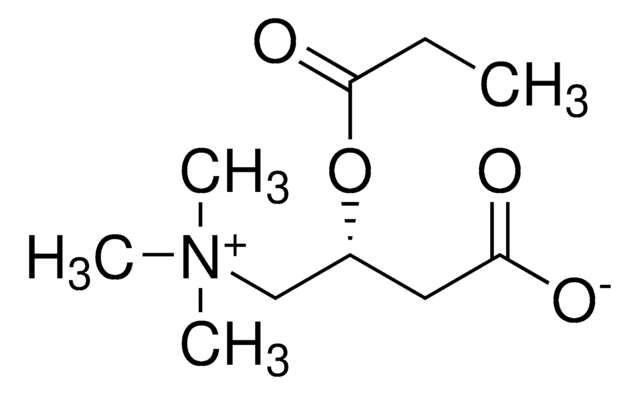
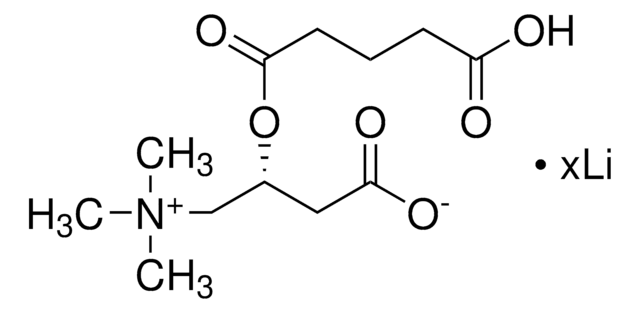
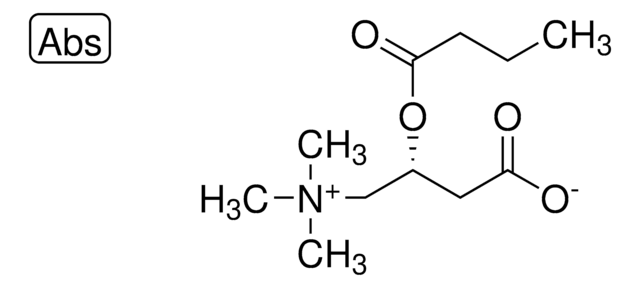
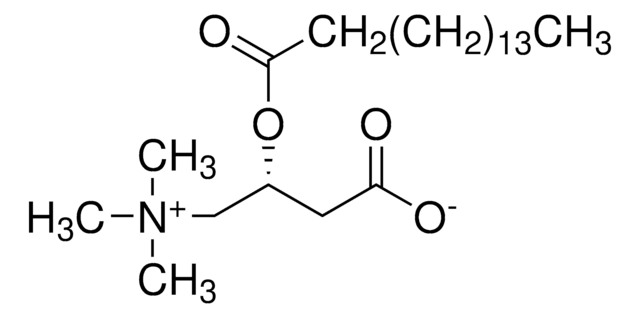
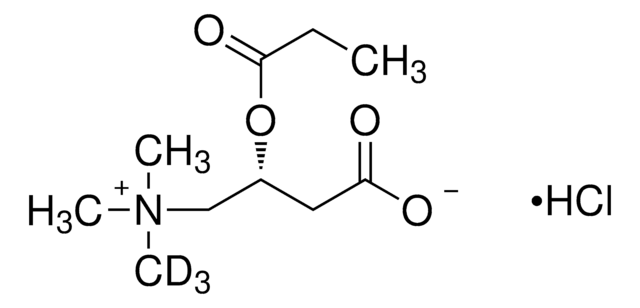
![[(3R)-3-Hydroxybutyryl]-L-carnitine analytical standard](/deepweb/assets/sigmaaldrich/product/structures/658/500/ff9570f8-a346-4077-9983-d0e67400bf47/640/ff9570f8-a346-4077-9983-d0e67400bf47.png)


